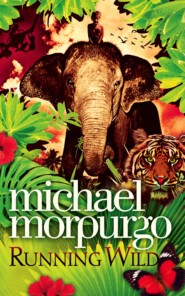По всем вопросам обращайтесь на: info@litportal.ru
(©) 2003-2024.
✖
The Butterfly Lion
Настройки чтения
Размер шрифта
Высота строк
Поля
We sat down close to the stove in a vast vaulted kitchen. “The kitchen’s always the warmest place,” she said, opening the oven door. “We’ll have you dry in no time. Scones?” she went on, bending down with some difficulty and reaching inside. “I always have scones on a Sunday. And tea to wash it down. All right for you?” She went on chatting away as she busied herself with the kettle and the teapot. The dog eyed me all the while from his basket, unblinking. “I was just thinking,” she said. “You’ll be the first young man I’ve had inside this house since Bertie.” She was silent for a while.
The smell of the scones wafted through the kitchen.
I ate three before I even touched my tea. They were sweet and crumbly, and succulent with melting butter. She talked on merrily again, to me, to the dog – I wasn’t sure which. I wasn’t really listening. I was looking out of the window behind her. The sun was bursting through the clouds and lighting the hillside. A perfect rainbow arched through the sky. But miraculous though it was, it wasn’t the rainbow that fascinated me. Somehow, the clouds were casting a strange shadow over the hillside, a shadow the shape of a lion, roaring like the one over the archway
“Sun’s come out,” said the old lady, offering me another scone. I took it eagerly. “Always does, you know. It may be difficult to remember sometimes, but there’s always sun behind the clouds, and the clouds do go in the end. Honestly.”
She watched me eat, a smile on her face that warmed me to the bone.
“Don’t think I want you to go, because I don’t. Nice to see a boy eat so well, nice to have the company; but all the same, I’d better get you back to school after you’ve had your tea, hadn’t I? You’ll only be in trouble otherwise. Mustn’t run off, you know. You’ve got to stick it out, see things through, do what’s got to be done, no matter what.” She was looking out of the window as she spoke. “My Bertie taught me that, bless him, or maybe I taught him. I can’t remember now.” And she went on talking and talking, but my mind was elsewhere again.
The lion on the hillside was still there, but now he was blue and shimmering in the sunlight. It was as if he were breathing, as if he were alive. It wasn’t a shadow any more. No shadow is blue. “No, you’re not seeing things,” the old lady whispered. “It’s not magic. He’s real enough. He’s our lion, Bertie’s and mine. He’s our butterfly lion.”
“What d’you mean?” I asked.
She looked at me long and hard. “I’ll tell you if you like,” she said. “Would you like to know? Would you really like to know?”
I nodded.
“Have another scone first and another cup of tea. Then I’ll take you to Africa where our lion came from, where my Bertie came from too. Bit of a story, I can tell you. You ever been to Africa?”
“No,” I replied.
“Well, you’re going,” she said. “We’re both going.”
Suddenly I wasn’t hungry any more. All I wanted now was to hear her story. She sat back in her chair, gazing out of the window. She told it slowly, thinking before each sentence; and all the while she never took her eyes off the butterfly lion. And neither did I.
Timbavati (#ulink_aed03dfd-242e-5228-9dd4-8e51fe276621)
Bertie was born in South Africa, in a remote farmhouse near a place called Timbavati. It was shortly after Bertie first started to walk that his mother and father decided a fence must be put around the farmhouse to make a compound where Bertie could play in safety It wouldn’t keep the snakes out – nothing could do that – but at least Bertie would be safe now from the leopards, and the lions and the spotted hyenas. Enclosed within the compound were the lawn and gardens at the front of the house, and the stables and barns at the back – all the room a child would need or want, you might think. But not Bertie.
The farm stretched as far as the eye could see in all directions, twenty thousand acres of veld. Bertie’s father farmed cattle, but times were hard. The rains had failed too often, and many of the rivers and waterholes had all but dried up. With fewer wildebeest and impala to prey on, the lions and leopards would sneak up on the cattle whenever they could. So Bertie’s father was more often than not away from home with his men, guarding the cattle. Every time he left, he’d say the same thing: “Don’t you ever open that gate, Bertie, you hear me? There’s lions out there, leopards, elephants, hyenas. You stay put, you hear?” Bertie would stand at the fence and watch him ride out, and he would be left behind with his mother, who was also his teacher. There were no schools for a hundred miles. And his mother too was always warning him to stay inside the fence. “Look what happened in Peter and the Wolf,” she would say.
His mother was often sick with malaria, and even when she wasn’t sick she would be listless and sad. There were good days, days when she would play the piano for him and play hide-and-seek around the compound. Or he’d sit on her lap on the sofa out on the veranda and she’d just talk and talk, all about her home in England, about how much she hated the wildness and the loneliness of Africa, and about how Bertie was everything to her. But they were rare days. Every morning he’d climb into her bed and snuggle up to her, hoping against hope that today she’d be well and happy; but so often she wasn’t, and Bertie would be left on his own again, to his own devices.
There was a waterhole downhill from the farmhouse, and some distance away. That waterhole, when there was water in it, became Bertie’s whole world. He would spend hours in the dusty compound, his hands gripping the fence, looking out at the wonders of the veld, at the giraffes drinking, spread-legged, at the waterhole; at the browsing impala, tails twitching, alert; at the warthogs snorting and snuffling under the shade of the shingayi trees; at the baboons, the zebras, the wildebeests, and the elephants bathing in the mud. But the moment Bertie always longed for was when a pride of lions came padding out of the veld. The impala were the first to spring away, then the zebra would panic and gallop off. Within seconds the lions would have the waterhole to themselves, and they would crouch to drink.
From the safe haven of the compound Bertie looked and learned as he grew up. By now, he could climb the tree by the farmhouse, and sit high in its branches. He could see better from up there. He would wait for his lions for hours on end. He got to know the life of the waterhole so well that he could feel the lions were out there, even before he saw them.
Bertie had no friends to play with, but he always said he was never lonely as a child. At night he loved reading his books and losing himself in the stories, and by day his heart was out in the veld with the animals. That was where he yearned to be. Whenever his mother was well enough, he would beg her to take him outside the compound, but her answer was always the same.
“I can’t, Bertie. Your father has forbidden it,” she’d say. And that was that.
The men would come home with their stories of the veld, of the family of cheetahs sitting like sentinels on their kopje, of the leopard they had spotted high in his tree larder watching over his kill, of the hyenas they had driven off, of the herd of elephants which had stampeded the cattle. And Bertie would listen wide-eyed, agog. Again and again he asked his father if he could go with him to help guard the cattle. His father just laughed, patted his head, and said it was man’s work. He did teach Bertie how to ride, and how to shoot too, but always within the confines of the compound.
Week in, week out, Bertie had to stay behind his fence. He made up his mind though, that if no one would take him out into the veld, then one day he would go by himself. But something always held him back. Perhaps it was one of those tales he’d been told of black mamba snakes whose bite would kill you within ten minutes, of hyenas whose jaws would crunch you to bits, of vultures who would finish off anything that was left so that no one would ever find even the bits. For the time being he stayed behind the fence. But the more he grew up, the more his compound became a prison to him.
One evening – Bertie must have been about six years old by now – he was sitting high up in the branches of his tree, hoping against hope the lions might come down for their sunset drink as they often did. He was thinking of giving up, for it would soon be too dark to see much now, when he saw a solitary lioness come down to the waterhole. Then he saw that she was not alone. Behind her, and on unsteady legs, came what looked like a lion cub – but it was white, glowing white in the gathering gloom of dusk.
While the lioness drank, the cub played at catching her tail; and then, when she had had her fill, the two of them slipped away into the long grass and were gone.
Bertie ran inside, screaming with excitement. He had to tell someone, anyone. He found his father working at his desk.
“Impossible,” said his father. “You’re seeing things that aren’t there, or you’re telling fibs – one of the two.”
“I saw him. I promise,” Bertie insisted. But his father would have none of it, and sent him to his room for arguing.
His mother came to see him later. “Anyone can make a mistake, Bertie dear,” she said. “It must have been the sunset. It plays tricks with your eyes sometimes. There’s no such thing as a white lion.”
The next evening Bertie watched again at the fence, but the white lion cub and the lioness did not come, nor did they the next evening, nor the next. Bertie began to think he must have been dreaming it.
A week or more passed, and there had been only a few zebras and wildebeest down at the waterhole. Bertie was already upstairs in his bed when he heard his father riding into the compound, and then the stamp of his heavy boots on the veranda.
“We got her! We got her!” he was saying. “Huge lioness, massive she was. She’s taken half a dozen of my best cattle in the last two weeks. Well, she won’t be taking any more.”
Bertie’s heart stopped. In that one terrible moment he knew which lioness his father was talking about. There could be no doubt about it. His white lion cub had been orphaned.
“But what if,” Bertie’s mother was saying, “what if she had young ones to feed? Perhaps they were starving.”
“So would we be if we let it go on. We had to shoot her,” his father retorted.
Bertie lay there all night listening to the plaintive roaring echoing through the veld, as if every lion in Africa was sounding a lament. He turned his face into his pillow and could think of nothing but the orphaned white cub, and he promised himself there and then that if ever the cub came down to the waterhole looking for his dead mother, then he would do what he had never dared to do, he would open the gate and go out and bring him home. He would not let him die out there all alone. But no lion cub came to his waterhole. All day, every day, he waited for him to come, but he never came.
Bertie and the Lion (#ulink_224c7bfa-09db-5a11-88ff-f3069b40d564)
One morning, a week or so later, Bertie was woken by a chorus of urgent neighing. He jumped out of his bed and ran to the window. A herd of zebras was scattering away from the waterhole, chased by a couple of hyenas. Then he saw more hyenas, three of them, standing stock still, noses pointing, eyes fixed on the waterhole. It was only now that Bertie saw the lion cub. But this one wasn’t white at all. He was covered in mud, with his back to the waterhole, and he was waving a pathetic paw at the hyenas who were beginning to circle. The lion cub had nowhere to run to, and the hyenas were sidling ever closer.
Bertie was downstairs in a flash, leaping off the veranda and racing barefoot across the compound, shouting at the top of his voice. He threw open the gate and charged down the hill towards the waterhole, yelling and screaming and waving his arms like a wild thing. Startled at this sudden intrusion, the hyenas turned tail and ran, but not far. Once within range Bertie hurled a broadside of pebbles at them, and they ran off again, but again not far. Then he was at the waterhole and between the lion cub and the hyenas, shouting at them to go away. They didn’t. They stood and watched, uncertain for a while. Then they began to circle again, closer, closer…
Вы ознакомились с фрагментом книги.
Приобретайте полный текст книги у нашего партнера:
Приобретайте полный текст книги у нашего партнера:











